- Home
- Peter F. Hamilton
The Mandel Files, Volume 2: The Nano Flower Page 3
The Mandel Files, Volume 2: The Nano Flower Read online
Page 3
‘You want combat, find yourself a general.’
‘No offence.’
‘For seven hundred K, offend away.’
Taylor Faulkner looked pained. He held up a platinum Zürich card, and showed it to the Amex which Suzi produced, using his thumb to authorize the transfer. She watched the Amex’s grey digits rise, and smiled tightly.
‘May I see what I’ve bought?’ he asked.
‘Sure.’ She scaled a palm-sized cybofax wafer across the table to him. ‘The code is: Goldpan. No hyphen. Anything else will crash wipe, OK?’
‘Yes.’ He pocketed the cybofax.
‘Nice knowing you, Mr Faulkner.’
He turned to the window and the gulls scratching away at the mud.
Suzi rose and made for the door. The sight of the figure in black cotton Levi’s standing at the bar drinking German beer from a bottle made her stop. Leol Reiger, another tekmerc commander. They’d worked together on a couple of deals, hadn’t got on. Not at all. Leol fancied himself as very big time. He was into running spoilers on kombinates, burning Japanese banks. Rumour said he’d even snatched data from Event Horizon. Suzi knew that wasn’t true; he was still alive. And he hadn’t been there when she came in.
She sat on a stool next to him, feet half a metre off the floor, putting their heads at almost the same level. Ordinarily she didn’t mind having to look up at people. But not Leol Reiger.
‘Slumming, Leol?’
Leol Reiger lowered his bottle, amber eyes set in a pale face stared at her. He had designer stubble and a receding hairline, oiled and slicked back. ‘Never learn, do you, Suzi. Four months for a soft penetration, that’s four months’ worth of exposure risk.’
‘Bollocks. What the fuck do you know about it?’ she asked, feeling a kick of dismay. How the hell did Leol Rieger know about her deal with Johal HF? He would never work for a company like Morrell, they were too small, too insignificant.
‘Know you checked the wrong people. You were looking down, Suzi. Then, down is where you come from. Once a Trinity, always a Trinity. Nothing more. You don’t have what it takes to make tekmerc, you never did.’
‘Lifted my data, and the target doesn’t even know it’s gone. Not like you. Your deals, all that’s left is smoking craters in the ground and bodies. Your catalogue’s getting pretty thin these days, Leol, right? Word’s around, not so many troops want in on your deals.’
‘That so?’ Leol Reiger gestured with the beer bottle.
Two men were sitting with Taylor Faulkner. Both of them hardline troops, Suzi could tell.
Leol Reiger took another sip. ‘You should’ve looked up, Suzi. A real tekmerc would’ve looked up. A real tekmerc would’ve seen how much that ionic streaming trick is really worth to Johal HF.’
She looked at Taylor Faulkner again, seeing how relaxed he was, smiling wanly out of the window. With sick certainty she knew she’d been switchbacked, the knowledge was like bile.
‘You were real careful looking down,’ Leol Reiger was saying. ‘Went through all Morrell’s personnel. But you should’ve been looking up, maybe got your hotrod to crack a few Johal HF files open. Done that, you’d have found our Faulkner here. Not a perfect specimen of humanity, our Faulkner.’ Leol Reiger finished his bottle, putting it on the bar.
Suzi had to look up at him.
‘Five million New Sterling, Suzi. That’s what me and my partner are going to get from Johal HF this afternoon when we deliver the ionic streaming data. I paid you out of petty cash.’ He turned to the barman. ‘Get the little lady a drink, whatever she wants. My treat.’
She watched Leol Reiger walk over to Taylor Faulkner, clap him on the shoulder. The two of them laughed. Fury and helplessness rooted her to the bar stool. That shit Leol Reiger had been right, that was the real source of the pain, not the money. She should’ve checked, should’ve ripped Taylor Faulkner a-fucking-part, built a proper profile, not just a poxy ident check.
‘What’ll it be?’ the barman asked.
Suzi picked up Leol Reiger’s empty beer bottle and hurled it at the row of optics.
2
Monaco at dusk was bathed in thick copper-red light as the dome diffused the last rays of the sun into a homogeneous glow, banishing shadows. Buildings seemed to shine of their own accord.
Charlotte Fielder admired the town’s tasteful stone-fronted buildings through the window of the chauffeured Aston Martin. Monaco’s architecture was a counterfeit of the late nineteenth century, a blend of French and Spanish; hacienda mansions, apartment blocks with elegant white façades, black railings, red clay tiles, verandas festooned with scarlet-flowering geraniums growing out of pots.
It was the kind of flawless recreation which only truly idle money could achieve. Hardly any of the town was more than twenty years old, so little had survived the razing, when the citizens of Nice had marched on the principality in search of food. Charlotte had been three years old when it happened. But she’d seen AV recordings of the aftermath at school; they reminded her of bombed-out towns from some war zone. Dunes of rubble, where a few walls and archways had endured the maddened assault to jut skywards like pagan altars, soot-blackened bricks, burnt spikes of wood, wisps of smoke twisting lazily. The heat-expanded Mediterranean sea had risen to swirl around that part of the town built on landfill sites, its filth-curdled water pushing a grisly tideline of bodies and seaweed along the crumpled streets. Even the colours had leached out of the images, fixing the scene in her mind as grainy black and white desolation.
The destruction had been spectacular even by the standards of a Europe which had almost collapsed into anarchy in those first few years of climatical tumult engendered by the Warming.
Charlotte retained only vague recollections of her early childhood when the world was plunged into chaos, dream sequences of places and faces, a seemingly endless procession of days when it was too hot and there was never enough to eat. Half of her waking hours had been spent roaming London’s wide bicycle-clogged streets, scavenging food from markets and street stalls. She had lived with her aunt Mavis, a woman in her late forties, with a round haunted face, always wearing floral-print dresses and pink slippers. Aunt Mavis never had a job; by design a lifetime dole dependant, she only took Charlotte in for the extra food allocation. Charlotte never saw any of it; her ration cards were traded with the spivs for bootleg gin, which Aunt Mavis would sit and drink in front of the big flatscreen on the lounge wall, curtains perpetually drawn.
The woman had exchanged reality for Globecast’s soaps, where formatted plots always rewarded a hard life with the glitter trappings of materialism and golden sunsets, love and caring. The channels offered her a glimpse of salvation from the Warming and the PSP, a world twisted out of recognition, becoming an electronic religion-substitute. Worshipped ceaselessly.
One evening, when she was seven, Charlotte had returned home to find her aunt pressed against the flatscreen, knocking on it tearfully and pleading with the handsome smiling characters to let her in. She had been put in an orphanage not long after. The hunger ended then, replaced by work in the kitchens, peeling vegetables, washing crockery.
That was when her life really began, the normality of school and other children. The only link with her past was a solid thread of determination never to be hungry again. Then Dmitri Baronski had come into her world when she was fifteen, and he made his offer, opening a door into a semi-magical realm where nobody ever lacked for anything.
The Aston Martin reached Monaco’s perimeter road, where the seamless translucent shell of the dome rose out of the concrete sea wall, curving gradually overhead, massive enough to hold up the sky. She could see a couple of jetties on the outside, sleek white-painted yachts bobbing gently at their moorings. Large circular tidal-turbine lagoons of gene-tailored coral mottled the quiet sea all the way out to the darkening horizon. Monaco still refused to plug into France’s electrical grid, remaining resolutely independent.
On the other side of the road were dignifie
d hotels with black-glass lobby doors and long balconies. She watched them go past, feeling a vague sense of amusement that a town which had so meticulously recreated the ambience of long-lost imperialistic elegance in its fabric and culture should seek shelter by huddling under a hyper-modern structure like the dome. It was a failing of the set she moved through, she thought, that they never strived for anything new. The talent and resources deployed here could just as easily have been used to create something bold and innovative. Instead, they turned automatically to the past, drowning themselves in the safety of their genteel heritage.
Yet, for her, the replication was less than perfect. She recognized the quality of crispness in the lines of the buildings, a cold efficiency in the determinedly handsome layout which betrayed the mentality of its originators. Monaco was a compact bundle of wealth, its borders jealously guarded. It had become an enclave, a fortified castle of the rich, complete with drawbridge.
Even with her whiter than white passport and prepaid hotel reservation the Immigration officials had taken their time before allowing her in. Permanent residency within the principality was strictly limited; you had to be proposed by three residents and demonstrate assets in excess of four million Eurofrancs before you could even register for consideration.
So Charlotte stood in the airport arrivals lounge in a queue of impatient, nervous people watching enviously as resident card holders zipped through their channel without any fuss. She had been afraid the hard-nosed woman behind the customs desk would open the flower box in her flight bag, ask questions about it. But the customs and immigration setup seemed more like a ritual than anything else. The wait, the questions, underlining that Monaco was different, not some common tourist resort or gambling state.
It was while she was standing there that she saw the man for the second time that day. He was in the same queue, ten places behind her. There was something about him, the way his cool eyes were never looking at her when she turned round, his phlegmatic indifference to queueing, which set him slightly apart, creepy almost. At any other time she would have guessed him to be a hardline bodyguard for some Monaco plutocrat, coming home after a holiday. But she had seen him earlier in the day at the Cape Town spaceport, mingling among the crowd of friends and relatives that had greeted the other passengers on her spaceplane flight. If she had seen him in the departure lounge, waiting for the connecting flight to Monaco, then it would only be natural for him to be standing in the queue behind her. But what had he been doing in the crowd waiting for the spaceplane?
Finally, her passport had been cleared, her invitation and hotel reservation validated by the Immigration officer, a matronly woman in a stiff blue uniform. Charlotte obediently thumbprinted the declaration on the officer’s terminal, confirming that she had read and would abide by the principality’s laws. She received her temporary visa from the unsmiling woman. Their eyes had met for a second, and Charlotte read the uniquely female contempt for the thousandth time. She had worn a scarlet Ashmi jumpsuit for her flight back to Earth, tucked into black leather cowboy boots, gold Amstrad cybofax wafer clipped into her top pocket, Ferranti sunglasses. About as expensively casual as you could get; she enjoyed the look in the mirror, a designer test-pilot. Then the Immigration bitch went and smashed her mood.
It was an appropriate entrance to Monaco, she thought later; scorn and suspicion dogging her steps.
The El Harhari hotel wasn’t much different to the others ringing the inside of the dome. A little larger, perhaps. Its colonnaded frontage a pearl-white marble that glowed pink in the directionless sunset. The Aston Martin swept smoothly up a looped drive lined by tall, bushy-topped palm trees. There was a stream of cars ahead of it, disgorging passengers outside the hotel’s main entrance.
The El Harhari was hosting the annual Newfields ball, a charity that sponsored educational courses for underprivileged children throughout Europe. There was nothing remarkable about the charity, or the ball. At least half a dozen similar fund-raising events were held in Monaco every night. But Newfields rose far above the ordinary by having Julia Evans on its board of trustees, making its ball the social event of the month. Tickets were seven thousand Eurofrancs apiece; touts charged twenty and cursed their scarcity.
Dmitri Baronski, Charlotte’s sponsor, had managed to get her one, shaking his head in dismay when she phoned him with the request. ‘What on Earth do you want to go to that function for?’ he’d asked. His thin, lined face seemed more fragile than usual, white hair drooping limply. The valley outside the Prezda arcology where he lived was visible through his apartment’s picture window behind him.
‘I just want to see Julia Evans,’ Charlotte had replied equitably. ‘I’ve always admired her. Meeting her would be a real treat.’ She didn’t like holding out on the old man, but it was a harmless piece of fun, exciting too, in its own way. That was the real reason she had agreed to make the delivery. She had spent years striving to bring stability into her life, overlooking the fact that it was the partner of monotony.
‘All right,’ Baronski had grumbled. ‘But all she’ll do is shake your hand and thank you for supporting the charity. Same as everybody else. You won’t be invited back to Wilholm Manor for tea on the lawn, you know.’
‘I don’t expect to be. A handshake will suit me fine.’
It had taken him six hours to track down a ticket for her. She never doubted he could do it. Then when he called her at the Cape Town spaceport to confirm, he also told her to introduce herself to Jason Whitehurst as soon as she reached the El Harhari. ‘He’s a nice enough old boy; and he’s English, too, so you should get on fine.’
‘OK.’ She had kept her face perfectly composed, just as Baronski himself had trained her, not letting her disappointment show. But it would have been nice to go to just one ball as a regular guest.
Baronski squirted Jason Whitehurst’s data profile into her cybofax for her to study during the flight to Monaco, and signed off chuntering.
She smiled fondly at the cybofax screen after his image had faded. Nothing ever seemed to faze the old duffer, no request too obtuse for him to handle; his shadowy web of contacts rivalled a superpower’s intelligence agency. It was a job Charlotte would love to take over when he retired. She suspected most of his girls shared that ambition.
The footman who opened the Aston Martin’s door was dressed in smart grey livery. Charlotte alighted gracefully, careful not to smile when she caught his eyes straying to her legs as her skirt rode up on the car’s cushioning. She’d had ten-centimetre bone grafts put in her legs, six centimetres above the knee, four below. Her muscles had been recontoured around the extensions. It was an expensive treatment, but well worth it. Her new legs were powerfully athletic, beautifully shaped; designed to make men wish.
Five huge aureate chandeliers hung in the El Harhari’s lobby, throwing a silver haze of light over the guests as they filed into the ballroom. The men wore formal dinner jackets, although some of them had military-style regalia complete with swords. The women were all in long gowns, dripping with diamonds.
Charlotte moved easily through the crowd, holding the flower presentation box in her left hand. Her gown was made from navy-blue silk with a décolleté neckline; with her long neck and short clipped sandy hair it looked as though she was showing more skin than she actually was. She felt rather than saw several of the men watching her.
She accepted a glass of champagne from the waiter, taking a sip as she looked round. The plush ballroom was nearly full, long stalactites of freshly cut flowers floated above the milling partygoers, a large orchestra occupied the raised stage. She saw a pair of matched Mercedes coupés on the side of the highly polished wooden dancefloor, the raffle’s grand prize.
Julia Evans was standing at the centre of a small group of Newfields’ committee members, greeting a long queue of guests. A dinner-jacketed channel gossipcast cameraman covered each introduction. Charlotte studied her closely. The owner of Event Horizon was thirty-four, tall, with an attract
ive oval face and light complexion; her chestnut hair was worn long and straight, falling halfway down her back. Her dress was emerald green, a fabric as smooth as oil, stylish rather than ostentatious. Even her jewellery was modest, a few small intricate pieces; making the elderly gem-bedecked dowagers in the queue seem absurdly gauche in comparison.
It was almost as though Julia Evans was using her own refinement to mock the crass flamboyance around her.
Charlotte found it difficult to look away. Julia Evans’s reputation exerted an intrinsic fascination. She had inherited Event Horizon, aged seventeen, from her equally famous grandfather, Philip Evans, and had gone on to run it with the kind of barbed efficiency which was beyond any of its rivals. The company’s fortune was based on its giga-conductor patent, a universal energy-storage system used to power everything from household gear to spaceplanes. Julia had shrewdly exploited the money which licensing brought in to expand Event Horizon until it dominated the post-Warming English economy. There were just so many legends, and rumours, so much gossip connected with this one woman, it was hard to relate all the allegations and acclaim to the slim figure standing a few metres away.
Watching her, Charlotte decided there was something different about her after all, a kind of glacial discipline. Julia’s small polite smile never faltered as she was introduced to the torrent of eager dignitaries. It was almost a regal quality.
‘Genuine power has an attraction more fundamental than gravity,’ Baronski once told Charlotte. ‘No matter whether it is an influence for good or supreme evil, it pulls people in and holds them spellbound.’
The effect Julia Evans had on people made Charlotte realize just how true that was. The snippets of conversation she’d overheard so far in the ballroom were all mundane, small talk. Everyone knew that Julia Evans didn’t like to talk shop at social functions. It was faintly ridiculous, the whole Mediterranean coast was talking about the new alliance between Egypt and the Turkish Islamic Republic, worried about how it would affect regional trade, whether a new Jihad legion would rise in North Africa. And the people here must be the most interested of all, they stood to make or lose fortunes on the outcome. But there wasn’t a word.

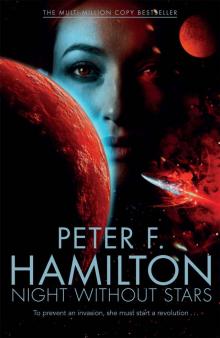 A Night Without Stars
A Night Without Stars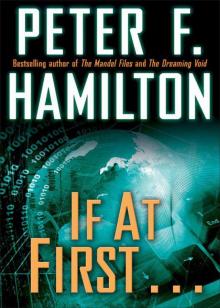 If at First . . .
If at First . . .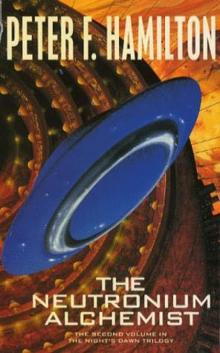 The Neutronium Alchemist
The Neutronium Alchemist Great North Road
Great North Road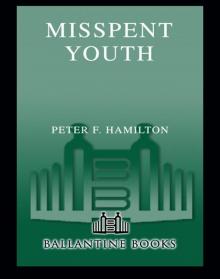 Misspent Youth
Misspent Youth Pandora's Star
Pandora's Star The Evolutionary Void
The Evolutionary Void The Dreaming Void
The Dreaming Void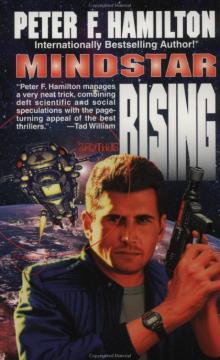 Mindstar Rising
Mindstar Rising The Temporal Void
The Temporal Void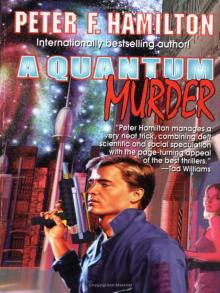 A Quantum Murder
A Quantum Murder The Hunting of the Princes
The Hunting of the Princes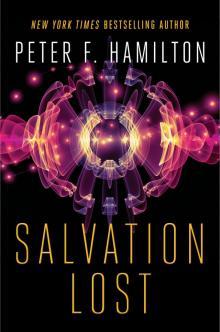 Salvation Lost
Salvation Lost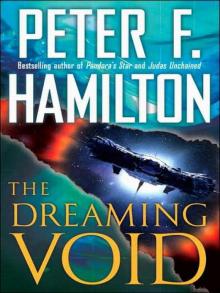 The Dreaming
The Dreaming Salvation
Salvation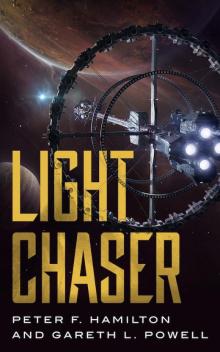 Light Chaser
Light Chaser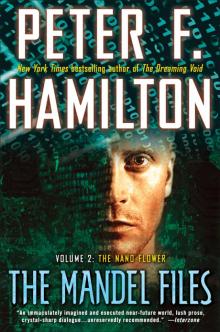 The Mandel Files, Volume 2: The Nano Flower
The Mandel Files, Volume 2: The Nano Flower![The Saints of Salvation [British Ed.] Read online](http://i1.bookreadfree.com/22/the_saints_of_salvation_british_ed__preview.jpg) The Saints of Salvation [British Ed.]
The Saints of Salvation [British Ed.]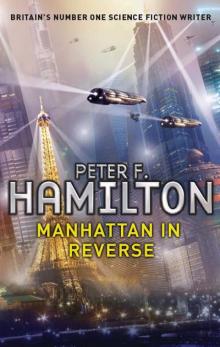 Manhattan in Reverse
Manhattan in Reverse The Secret Throne
The Secret Throne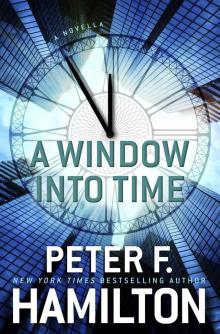 A Window Into Time
A Window Into Time A Second Chance at Eden
A Second Chance at Eden The Nano Flower
The Nano Flower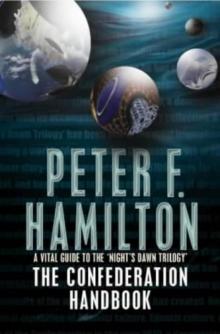 The Confederation Handbook
The Confederation Handbook The Naked God
The Naked God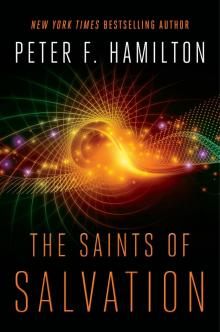 The Saints of Salvation
The Saints of Salvation The Void Trilogy 3-Book Bundle
The Void Trilogy 3-Book Bundle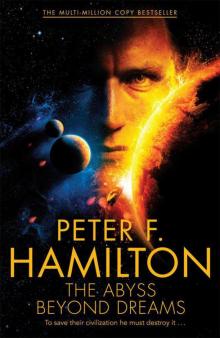 The Abyss Beyond Dreams
The Abyss Beyond Dreams A Voyage Through Air
A Voyage Through Air Judas Unchained
Judas Unchained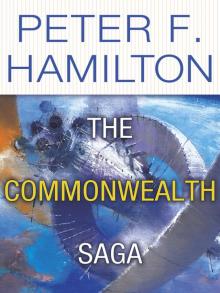 The Commonwealth Saga 2-Book Bundle
The Commonwealth Saga 2-Book Bundle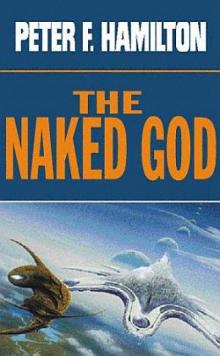 The Naked God - Flight nd-5
The Naked God - Flight nd-5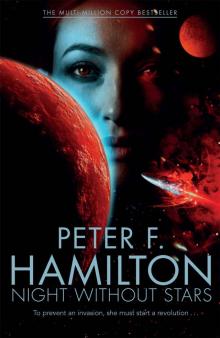 Night Without Stars (Chronicle of the Fallers Book 2)
Night Without Stars (Chronicle of the Fallers Book 2)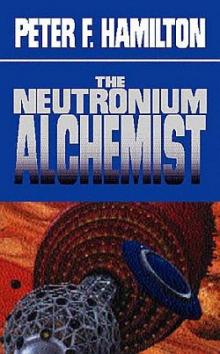 Neutronium Alchemist - Conflict nd-4
Neutronium Alchemist - Conflict nd-4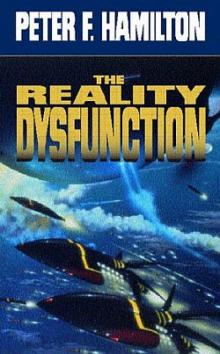 Reality Dysfunction - Expansion nd-2
Reality Dysfunction - Expansion nd-2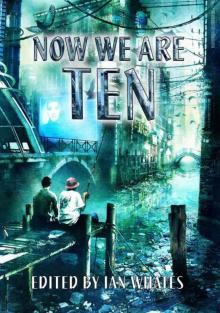 Now We Are Ten: Celebrating the First Ten Years of NewCon Press
Now We Are Ten: Celebrating the First Ten Years of NewCon Press Neutronium Alchemist - Consolidation nd-3
Neutronium Alchemist - Consolidation nd-3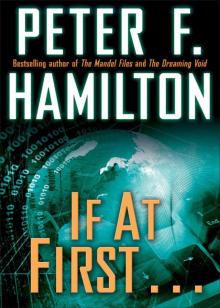 If at First . . . (Short Story)
If at First . . . (Short Story)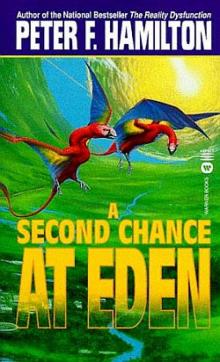 A Second Chance at Eden nd-7
A Second Chance at Eden nd-7 Judas Unchained cs-2
Judas Unchained cs-2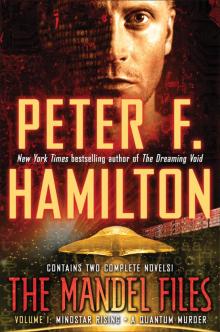 The Mandel Files, Volume 1
The Mandel Files, Volume 1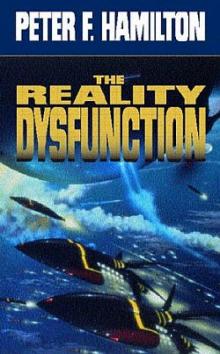 Reality Dysfunction — Emergence nd-1
Reality Dysfunction — Emergence nd-1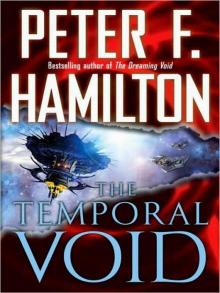 The Temporal Void (ARC)
The Temporal Void (ARC)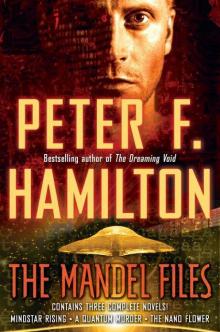 The Mandel Files
The Mandel Files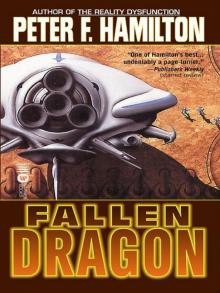 Fallen Fragon
Fallen Fragon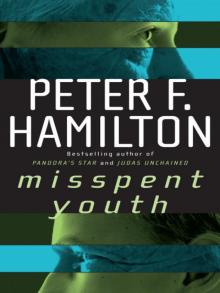 Misspent Youth (commonwealth saga)
Misspent Youth (commonwealth saga)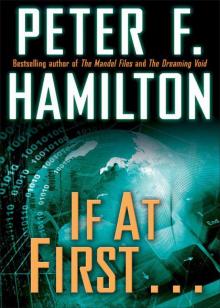 If at First...
If at First... Best of British Science Fiction 2016
Best of British Science Fiction 2016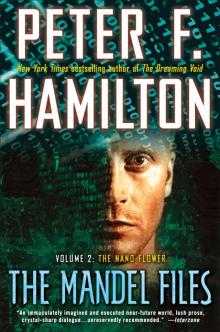 The Mandel Files, Volume 2
The Mandel Files, Volume 2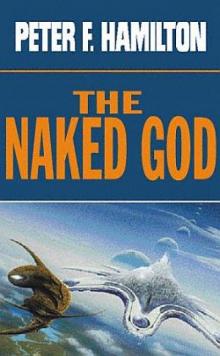 The Naked God - Faith nd-6
The Naked God - Faith nd-6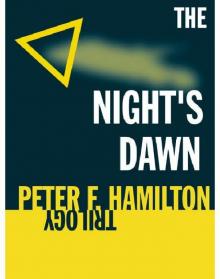 The Night's Dawn Trilogy
The Night's Dawn Trilogy Pandora's Star cs-2
Pandora's Star cs-2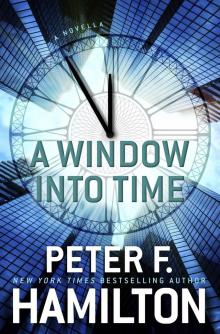 A Window into Time (Novella)
A Window into Time (Novella)